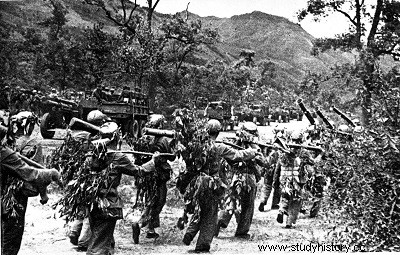
During the first ten weeks following the outbreak of the Korean War on June 25, 1950, the new government of the People's Republic of China, in place for 9 months, was able to content itself with observing the unfolding of events. If these delighted the Communists, Chinese or otherwise, they were, on the other hand, particularly worrying for the Western democracies.
Since Korea had been divided into two zones, following the Second World War, the region of the 38' parallel was constantly the scene of unrest and tension. The two Republics of Korea which had been respectively proclaimed in August and September 1948, in the southern part under American influence and in the northern part occupied by the Russians, had inherited incompatible political creeds. The ideological conflict turned into an armed confrontation when the communist troops of the North Korean People's Republic
crossed the 18' parallel and swept into the territory of the Republic of Korea (the R.O.K.), supported by the Americans.
After a brutal breakthrough, the North Koreans quickly captured almost all of South Korea. The ill-prepared South Koreans were collapsing with catastrophic speed. Despite reinforcements sent by the United States and other United Nations member countries at the end of July, non-Communist forces clung desperately to a small island of resistance, the port area of Pusan, in the south of the peninsula. .
At this time, it seemed eminently probable that a new country in Asia, the second in a year, was going to fall into the hands of the Communists — the first had been China in October 1949. So it was with great relief that the West received the news of the successful landings of the US 10th Marine Corps at Inchon in mid-September and witnessed the astonishing success of the counter-attack which ensued. The defenders of the Pusan perimeter broke through the Communist encirclement and, with the aid of recently arrived United Nations units, crushed the North Koreans, driving them back to the 38' parallel and beyond. On October 2, the South Koreans crossed the border, followed by the Americans a week later. At the end of October, the forces of the U.N. had invested Pyongyang, capital of North Korea. In the space of barely five weeks, luck and anxiety had changed sides.
With the enemy less than 250 km from the Yalu, the river separating China and South Korea North, the Chinese Communists found themselves directly threatened. Far from having firmly established their power in China, they particularly feared the “imperialist influence” on their border. If the shield constituted by the North Korean state bordering Manchuria fell, Communist China would be in direct contact with what it considered to be a hotbed of subversion. The United Nations seemed suspicious to them since it had refused to recognize the People's Republic and, in any case, the Chinese considered that it was nothing more than an operational support for new American ambitions.
All these compelling reasons justified the intervention of the Chinese Communists in the Korean War. They entered the arena cautiously, confining themselves at first to violent verbal warnings that "the Chinese people would not tolerate with impunity seeing their neighbors savagely invaded by the imperialists". At the same time, they had made practical arrangements. By July they had massed 116,000 men in Manchuria. By the end of August, their numbers had more than doubled to 250,000. By October, when U.N. continued their inexorable advance northwards towards the Yalu River, the Chinese armies in Manchuria approached 750,000 men.
From October 14 to 16, the first of these soldiers, "the People's Volunteers,” as they were called, began to infiltrate into North Korea during the night through the bridges of the Yalu. By November 1, 18 Chinese divisions, 180,000 strong, had crossed the river and two weeks later, 300,000 men had surreptitiously entered South Korea.
Unwittingly, the United Nations had helped to keep this infiltration secret by prohibiting reconnaissance flights north of the Yalu. about troop movements, whereabouts, and bases in Manchuria.
Such knowledge would probably have altered MacArthur's opinion of the Chinese warnings as bluffing and propaganda. MacArthur was sure that the Chinese would not enter the war in force unless Manchuria was invaded.Unfortunately for the United Nations, he persisted in his idea in spite of the evidence, which later would be to him. criticized by its detractors as a serious mistake.
On October 26, part of the 7th Regiment of the South Korean 6th Division was the first United Nations force to reach Yalu. The next day, after a fierce and close fight, in freezing winter weather, the South Koreans were overwhelmed by Chinese Communist troops. On October 28, the rest of the 6th Division suffered the same fate. At the same time, three other South Korean divisions flanking the US Eighth Army were routed, leaving the American right flank exposed.
The US 8th Cavalry Regiment, belonging to the Eighth Army, went into action to try to rectify the situation but the rescuers became victims. Near the small town of Pusan, on November 1, the 3rd Cavalry Battalion was surrounded by Chinese hordes who rushed into battle to the sound of bugles, with shrill whistles, fighting to the end with extraordinary tenacity. It was the first American experience, which was to be repeated over the following months with sickening regularity, of the Chinese troops' utter disregard for their own safety and their complete indifference to death, a surprising indifference to Western minds. . During this battle, the small groups of encircled Americans fought on positions littered with the corpses of Chinese, piled in places in three layers. This spectacle did not seem to move the other Chinese who advanced in waves of 300 to 400 on a carpet of corpses, attacking the same position up to six times in a row. Although costly, this tactic pulverized the 3rd Battalion:only a handful of survivors remained who managed to drag themselves to the United Nations lines.
